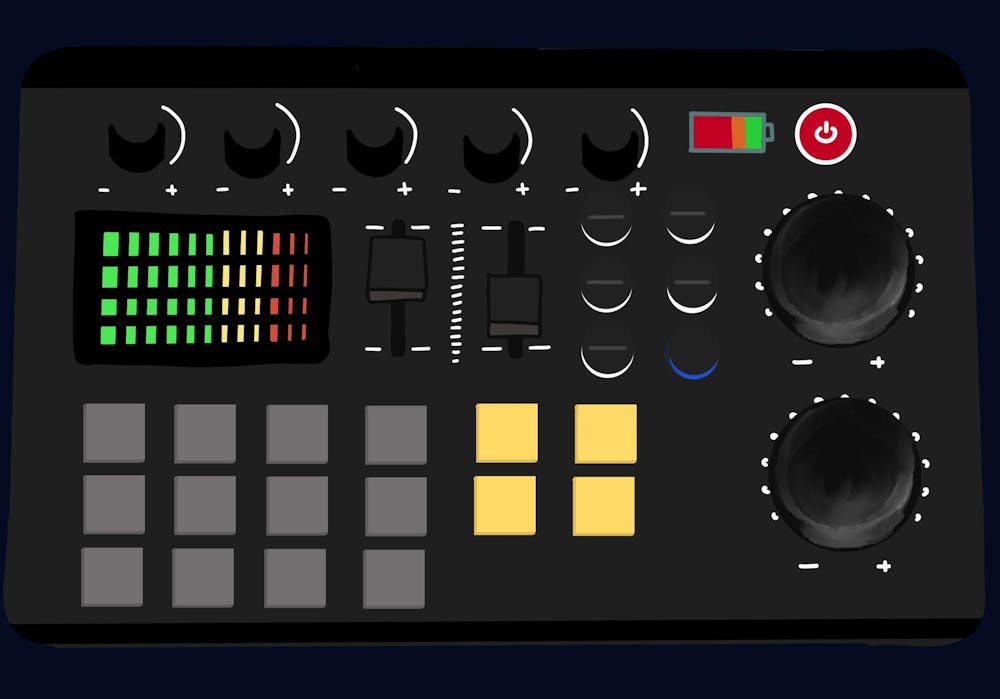The University music scene is known for its popular fraternity bands, its well-attended house shows of Indieheads — a student-run music organization — and its cult-like a cappella culture. However, one crucial aspect of the music industry is missing from this picture — music production. Noticing that there was no dedicated space to appreciate this artform amongst the University’s plethora of extracurricular offerings, fourth-year College student Lennon Newsom and third-year College student Owen Larson took it upon themselves this fall to start Hoos Producing, the University’s first music production club.
Music production describes the behind the scenes facets of the music creation process, including composing, editing, arranging and mixing audio to make a song. Newsom and Larson first bonded over their love for the craft at an Indieheads show, when Larson recognized Newson from their physics class as the kid who shared “I make electronic music” as his first day of class fun fact. After finding someone with a similar passion for production, Newsom said he suggested the two start a club.
As a physics major, Newsom said that most of his time has been dedicated to managing his very quantitative-heavy course load. Because most of his time is spent working with numbers and theorems, he said he has found music production as an outlet to express his more creative side since his freshman year of high school. Newsom said it is this personal experience with the art form that made want to create a club for students at the University who also see music production as an artistic refuge.
“Ever since my first year walking around the activities fair I was very disappointed that there was no music production club,” Newsom explained. “So I finally had the time this semester to start it.”
Still in its infancy, Newsom said that the club has had two meetings in New Cabell Hall so far, hosting over 15 enthusiastic new members with different majors, music tastes and experience levels in music production. Since the club is still getting itself off the ground, the meetings haven’t consisted of testing skills just yet, but instead have been spent letting members get to know one another and listen to each other’s music. Newsom said that they hope that future meetings will include a variety of activities like music competitions and skills workshops.
Larson also shares this hope, stating that the students who have attended these first two meetings have made him confident that the club will only get better as they continue to cement themselves.
“The students who’ve joined so far have demonstrated so much passion and have given us many great ideas,” Larson said. “Lennon and I are very optimistic about what the future holds for Hoos Producing.”
Newsom said one of the most useful parts of this new community is that it provides a place for music lovers to receive informed and useful feedback on the beats and songs they produce. Newsom said that this collaborative aspect of the club is particularly beneficial, sharing that this kind of critique typically can be hard to get from family and friends.
“A lot of these people in the club so far have never had people that could provide genuine feedback before on music that they've made, because they're sharing it with their friends and family, people that don't have production experience,” Newsom said. “So now we have a network of people that know how that was made [and can] give you advice on specifics.”
While this club provides a place for existing fans of music production to help each other out in this way, its founders encourage people with no background experience in the craft to join as well.
Newsom said that while one common obstacle for new music producers is the high cost of equipment — like a MIDI controller or audio interface, which can be anywhere from hundreds to thousands of dollars — he wants to assure students that buying equipment is by no means a requirement to join Hoos Producing. In fact, he said he thinks some of the best music made has been produced using the cheapest equipment, like the free GarageBand app.
“You can make the best music in the world and it can be free,” Newsom said. “You’d be surprised about the songs that you would recognize that were made on an iPhone.”
After consistently meeting throughout this semester, the club hopes to gain Contracted Independent Organization status in the spring. This status would afford them more funding from Student Council to expand the offerings of the club and better support its members.
“Right now, you could think of Hoos Producing as a close-knit group of students who love making, sharing and collaborating with each other on music,” Larson said. “We’ve really only scratched the surface in terms of what we imagined this club to be.”
Whether you are an experienced music producer or totally tone deaf, the club offers judgment-free space for all Hoos to explore the art of music creation with a group of similarly passionate peers.







